2019-04-01 23:57:24 +03:00
|
|
|
---
|
|
|
|
|
title: Demo
|
2019-12-02 22:03:32 +03:00
|
|
|
weight: 1
|
2019-04-01 23:57:24 +03:00
|
|
|
---
|
2016-05-18 21:26:08 +03:00
|
|
|
|
|
|
|
|
This series of examples shows the basic procedures for working with an etcd cluster.
|
|
|
|
|
|
|
|
|
|
## Set up a cluster
|
|
|
|
|
|
2019-12-02 22:03:32 +03:00
|
|
|
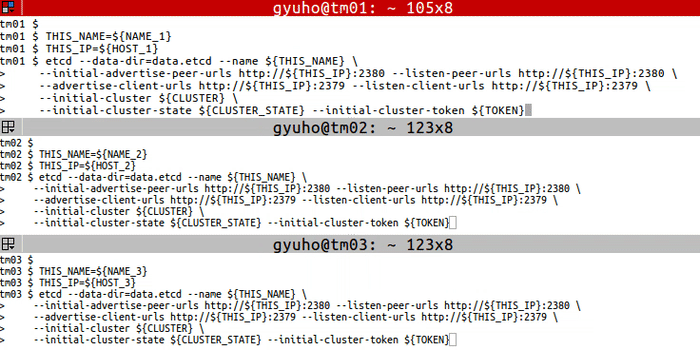
|
2016-05-18 21:26:08 +03:00
|
|
|
|
|
|
|
|
On each etcd node, specify the cluster members:
|
|
|
|
|
|
2019-12-02 22:03:32 +03:00
|
|
|
```shell
|
2016-05-18 21:26:08 +03:00
|
|
|
TOKEN=token-01
|
|
|
|
|
CLUSTER_STATE=new
|
|
|
|
|
NAME_1=machine-1
|
|
|
|
|
NAME_2=machine-2
|
|
|
|
|
NAME_3=machine-3
|
|
|
|
|
HOST_1=10.240.0.17
|
|
|
|
|
HOST_2=10.240.0.18
|
|
|
|
|
HOST_3=10.240.0.19
|
|
|
|
|
CLUSTER=${NAME_1}=http://${HOST_1}:2380,${NAME_2}=http://${HOST_2}:2380,${NAME_3}=http://${HOST_3}:2380
|
|
|
|
|
```
|
|
|
|
|
|
|
|
|
|
Run this on each machine:
|
|
|
|
|
|
2019-12-02 22:03:32 +03:00
|
|
|
```shell
|
2016-05-18 21:26:08 +03:00
|
|
|
# For machine 1
|
|
|
|
|
THIS_NAME=${NAME_1}
|
|
|
|
|
THIS_IP=${HOST_1}
|
|
|
|
|
etcd --data-dir=data.etcd --name ${THIS_NAME} \
|
|
|
|
|
--initial-advertise-peer-urls http://${THIS_IP}:2380 --listen-peer-urls http://${THIS_IP}:2380 \
|
|
|
|
|
--advertise-client-urls http://${THIS_IP}:2379 --listen-client-urls http://${THIS_IP}:2379 \
|
|
|
|
|
--initial-cluster ${CLUSTER} \
|
|
|
|
|
--initial-cluster-state ${CLUSTER_STATE} --initial-cluster-token ${TOKEN}
|
|
|
|
|
|
|
|
|
|
# For machine 2
|
|
|
|
|
THIS_NAME=${NAME_2}
|
|
|
|
|
THIS_IP=${HOST_2}
|
|
|
|
|
etcd --data-dir=data.etcd --name ${THIS_NAME} \
|
|
|
|
|
--initial-advertise-peer-urls http://${THIS_IP}:2380 --listen-peer-urls http://${THIS_IP}:2380 \
|
|
|
|
|
--advertise-client-urls http://${THIS_IP}:2379 --listen-client-urls http://${THIS_IP}:2379 \
|
|
|
|
|
--initial-cluster ${CLUSTER} \
|
|
|
|
|
--initial-cluster-state ${CLUSTER_STATE} --initial-cluster-token ${TOKEN}
|
|
|
|
|
|
|
|
|
|
# For machine 3
|
|
|
|
|
THIS_NAME=${NAME_3}
|
|
|
|
|
THIS_IP=${HOST_3}
|
|
|
|
|
etcd --data-dir=data.etcd --name ${THIS_NAME} \
|
|
|
|
|
--initial-advertise-peer-urls http://${THIS_IP}:2380 --listen-peer-urls http://${THIS_IP}:2380 \
|
|
|
|
|
--advertise-client-urls http://${THIS_IP}:2379 --listen-client-urls http://${THIS_IP}:2379 \
|
|
|
|
|
--initial-cluster ${CLUSTER} \
|
|
|
|
|
--initial-cluster-state ${CLUSTER_STATE} --initial-cluster-token ${TOKEN}
|
|
|
|
|
```
|
|
|
|
|
|
|
|
|
|
Or use our public discovery service:
|
|
|
|
|
|
2019-12-02 22:03:32 +03:00
|
|
|
```shell
|
2016-05-18 21:26:08 +03:00
|
|
|
curl https://discovery.etcd.io/new?size=3
|
|
|
|
|
https://discovery.etcd.io/a81b5818e67a6ea83e9d4daea5ecbc92
|
|
|
|
|
|
|
|
|
|
# grab this token
|
|
|
|
|
TOKEN=token-01
|
|
|
|
|
CLUSTER_STATE=new
|
|
|
|
|
NAME_1=machine-1
|
|
|
|
|
NAME_2=machine-2
|
|
|
|
|
NAME_3=machine-3
|
|
|
|
|
HOST_1=10.240.0.17
|
|
|
|
|
HOST_2=10.240.0.18
|
|
|
|
|
HOST_3=10.240.0.19
|
|
|
|
|
DISCOVERY=https://discovery.etcd.io/a81b5818e67a6ea83e9d4daea5ecbc92
|
|
|
|
|
|
|
|
|
|
THIS_NAME=${NAME_1}
|
|
|
|
|
THIS_IP=${HOST_1}
|
|
|
|
|
etcd --data-dir=data.etcd --name ${THIS_NAME} \
|
|
|
|
|
--initial-advertise-peer-urls http://${THIS_IP}:2380 --listen-peer-urls http://${THIS_IP}:2380 \
|
|
|
|
|
--advertise-client-urls http://${THIS_IP}:2379 --listen-client-urls http://${THIS_IP}:2379 \
|
|
|
|
|
--discovery ${DISCOVERY} \
|
|
|
|
|
--initial-cluster-state ${CLUSTER_STATE} --initial-cluster-token ${TOKEN}
|
|
|
|
|
|
|
|
|
|
THIS_NAME=${NAME_2}
|
|
|
|
|
THIS_IP=${HOST_2}
|
|
|
|
|
etcd --data-dir=data.etcd --name ${THIS_NAME} \
|
|
|
|
|
--initial-advertise-peer-urls http://${THIS_IP}:2380 --listen-peer-urls http://${THIS_IP}:2380 \
|
|
|
|
|
--advertise-client-urls http://${THIS_IP}:2379 --listen-client-urls http://${THIS_IP}:2379 \
|
|
|
|
|
--discovery ${DISCOVERY} \
|
|
|
|
|
--initial-cluster-state ${CLUSTER_STATE} --initial-cluster-token ${TOKEN}
|
|
|
|
|
|
|
|
|
|
THIS_NAME=${NAME_3}
|
|
|
|
|
THIS_IP=${HOST_3}
|
|
|
|
|
etcd --data-dir=data.etcd --name ${THIS_NAME} \
|
|
|
|
|
--initial-advertise-peer-urls http://${THIS_IP}:2380 --listen-peer-urls http://${THIS_IP}:2380 \
|
|
|
|
|
--advertise-client-urls http://${THIS_IP}:2379 --listen-client-urls http://${THIS_IP}:2379 \
|
|
|
|
|
--discovery ${DISCOVERY} \
|
|
|
|
|
--initial-cluster-state ${CLUSTER_STATE} --initial-cluster-token ${TOKEN}
|
|
|
|
|
```
|
|
|
|
|
|
|
|
|
|
Now etcd is ready! To connect to etcd with etcdctl:
|
|
|
|
|
|
2019-12-02 22:03:32 +03:00
|
|
|
```shell
|
2016-05-18 21:26:08 +03:00
|
|
|
export ETCDCTL_API=3
|
|
|
|
|
HOST_1=10.240.0.17
|
|
|
|
|
HOST_2=10.240.0.18
|
|
|
|
|
HOST_3=10.240.0.19
|
|
|
|
|
ENDPOINTS=$HOST_1:2379,$HOST_2:2379,$HOST_3:2379
|
|
|
|
|
|
|
|
|
|
etcdctl --endpoints=$ENDPOINTS member list
|
|
|
|
|
```
|
|
|
|
|
|
|
|
|
|
|
|
|
|
|
## Access etcd
|
|
|
|
|
|
2019-12-02 22:03:32 +03:00
|
|
|

|
2016-05-18 21:26:08 +03:00
|
|
|
|
|
|
|
|
`put` command to write:
|
|
|
|
|
|
2019-12-02 22:03:32 +03:00
|
|
|
```shell
|
2016-05-18 21:26:08 +03:00
|
|
|
etcdctl --endpoints=$ENDPOINTS put foo "Hello World!"
|
|
|
|
|
```
|
|
|
|
|
|
|
|
|
|
`get` to read from etcd:
|
|
|
|
|
|
2019-12-02 22:03:32 +03:00
|
|
|
```shell
|
2016-05-18 21:26:08 +03:00
|
|
|
etcdctl --endpoints=$ENDPOINTS get foo
|
|
|
|
|
etcdctl --endpoints=$ENDPOINTS --write-out="json" get foo
|
|
|
|
|
```
|
|
|
|
|
|
|
|
|
|
|
|
|
|
|
## Get by prefix
|
|
|
|
|
|
2019-12-02 22:03:32 +03:00
|
|
|
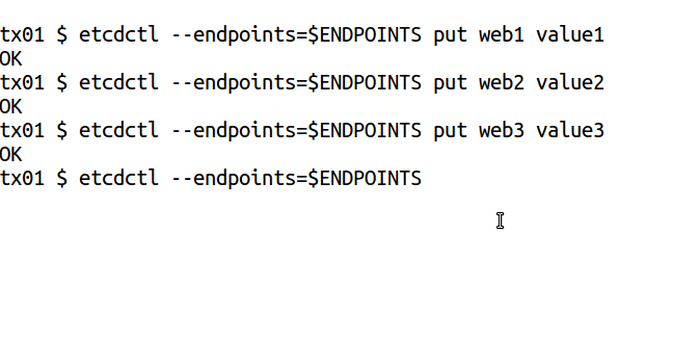
|
2016-05-18 21:26:08 +03:00
|
|
|
|
2019-12-02 22:03:32 +03:00
|
|
|
```shell
|
2016-05-18 21:26:08 +03:00
|
|
|
etcdctl --endpoints=$ENDPOINTS put web1 value1
|
|
|
|
|
etcdctl --endpoints=$ENDPOINTS put web2 value2
|
|
|
|
|
etcdctl --endpoints=$ENDPOINTS put web3 value3
|
|
|
|
|
|
|
|
|
|
etcdctl --endpoints=$ENDPOINTS get web --prefix
|
|
|
|
|
```
|
|
|
|
|
|
|
|
|
|
|
|
|
|
|
## Delete
|
|
|
|
|
|
2019-12-02 22:03:32 +03:00
|
|
|
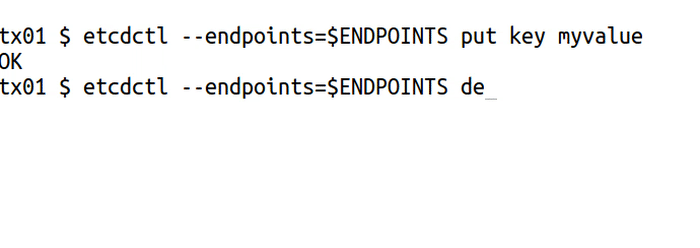
|
2016-05-18 21:26:08 +03:00
|
|
|
|
2019-12-02 22:03:32 +03:00
|
|
|
```shell
|
2016-05-18 21:26:08 +03:00
|
|
|
etcdctl --endpoints=$ENDPOINTS put key myvalue
|
|
|
|
|
etcdctl --endpoints=$ENDPOINTS del key
|
|
|
|
|
|
|
|
|
|
etcdctl --endpoints=$ENDPOINTS put k1 value1
|
|
|
|
|
etcdctl --endpoints=$ENDPOINTS put k2 value2
|
|
|
|
|
etcdctl --endpoints=$ENDPOINTS del k --prefix
|
|
|
|
|
```
|
|
|
|
|
|
|
|
|
|
|
|
|
|
|
## Transactional write
|
|
|
|
|
|
|
|
|
|
`txn` to wrap multiple requests into one transaction:
|
|
|
|
|
|
2019-12-02 22:03:32 +03:00
|
|
|
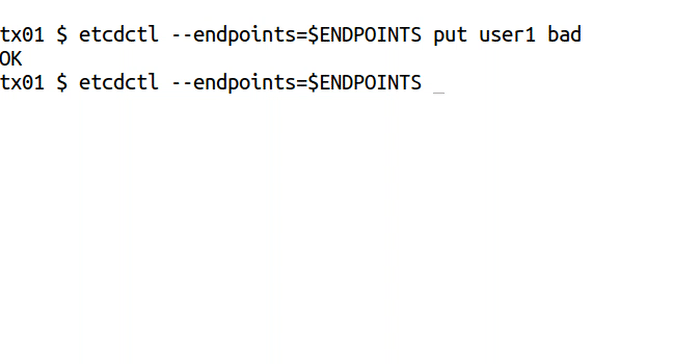
|
2016-05-18 21:26:08 +03:00
|
|
|
|
2019-12-02 22:03:32 +03:00
|
|
|
```shell
|
2016-05-18 21:26:08 +03:00
|
|
|
etcdctl --endpoints=$ENDPOINTS put user1 bad
|
|
|
|
|
etcdctl --endpoints=$ENDPOINTS txn --interactive
|
|
|
|
|
|
|
|
|
|
compares:
|
|
|
|
|
value("user1") = "bad"
|
|
|
|
|
|
|
|
|
|
success requests (get, put, delete):
|
|
|
|
|
del user1
|
|
|
|
|
|
|
|
|
|
failure requests (get, put, delete):
|
|
|
|
|
put user1 good
|
|
|
|
|
```
|
|
|
|
|
|
|
|
|
|
|
|
|
|
|
## Watch
|
|
|
|
|
|
|
|
|
|
`watch` to get notified of future changes:
|
|
|
|
|
|
2019-12-02 22:03:32 +03:00
|
|
|
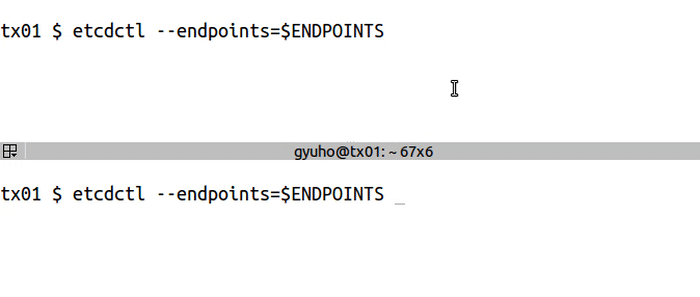
|
2016-05-18 21:26:08 +03:00
|
|
|
|
2019-12-02 22:03:32 +03:00
|
|
|
```shell
|
2016-05-18 21:26:08 +03:00
|
|
|
etcdctl --endpoints=$ENDPOINTS watch stock1
|
|
|
|
|
etcdctl --endpoints=$ENDPOINTS put stock1 1000
|
|
|
|
|
|
|
|
|
|
etcdctl --endpoints=$ENDPOINTS watch stock --prefix
|
|
|
|
|
etcdctl --endpoints=$ENDPOINTS put stock1 10
|
|
|
|
|
etcdctl --endpoints=$ENDPOINTS put stock2 20
|
|
|
|
|
```
|
|
|
|
|
|
|
|
|
|
|
|
|
|
|
## Lease
|
|
|
|
|
|
|
|
|
|
`lease` to write with TTL:
|
|
|
|
|
|
|
|
|
|
|
2019-12-02 22:03:32 +03:00
|
|
|
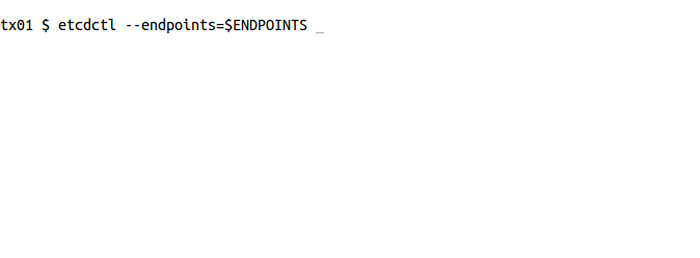
|
|
|
|
|
|
|
|
|
|
```shell
|
2016-05-18 21:26:08 +03:00
|
|
|
etcdctl --endpoints=$ENDPOINTS lease grant 300
|
|
|
|
|
# lease 2be7547fbc6a5afa granted with TTL(300s)
|
|
|
|
|
|
|
|
|
|
etcdctl --endpoints=$ENDPOINTS put sample value --lease=2be7547fbc6a5afa
|
|
|
|
|
etcdctl --endpoints=$ENDPOINTS get sample
|
|
|
|
|
|
|
|
|
|
etcdctl --endpoints=$ENDPOINTS lease keep-alive 2be7547fbc6a5afa
|
|
|
|
|
etcdctl --endpoints=$ENDPOINTS lease revoke 2be7547fbc6a5afa
|
|
|
|
|
# or after 300 seconds
|
|
|
|
|
etcdctl --endpoints=$ENDPOINTS get sample
|
|
|
|
|
```
|
|
|
|
|
|
|
|
|
|
|
|
|
|
|
## Distributed locks
|
|
|
|
|
|
|
|
|
|
`lock` for distributed lock:
|
|
|
|
|
|
2019-12-02 22:03:32 +03:00
|
|
|
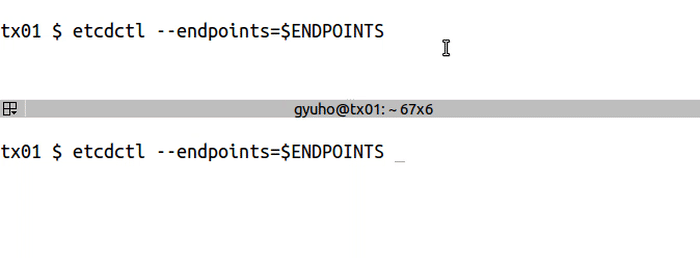
|
2016-05-18 21:26:08 +03:00
|
|
|
|
2019-12-02 22:03:32 +03:00
|
|
|
```shell
|
2016-05-18 21:26:08 +03:00
|
|
|
etcdctl --endpoints=$ENDPOINTS lock mutex1
|
|
|
|
|
|
|
|
|
|
# another client with the same name blocks
|
|
|
|
|
etcdctl --endpoints=$ENDPOINTS lock mutex1
|
|
|
|
|
```
|
|
|
|
|
|
|
|
|
|
|
|
|
|
|
## Elections
|
|
|
|
|
|
|
|
|
|
`elect` for leader election:
|
|
|
|
|
|
2019-12-02 22:03:32 +03:00
|
|
|
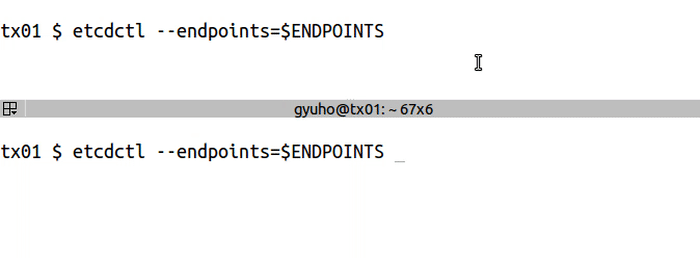
|
2016-05-18 21:26:08 +03:00
|
|
|
|
2019-12-02 22:03:32 +03:00
|
|
|
```shell
|
2016-05-18 21:26:08 +03:00
|
|
|
etcdctl --endpoints=$ENDPOINTS elect one p1
|
|
|
|
|
|
|
|
|
|
# another client with the same name blocks
|
|
|
|
|
etcdctl --endpoints=$ENDPOINTS elect one p2
|
|
|
|
|
```
|
|
|
|
|
|
|
|
|
|
|
|
|
|
|
## Cluster status
|
|
|
|
|
|
|
|
|
|
Specify the initial cluster configuration for each machine:
|
|
|
|
|
|
2019-12-02 22:03:32 +03:00
|
|
|
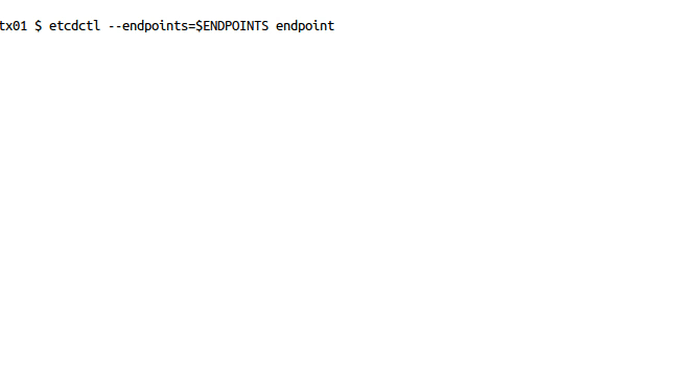
|
2016-05-18 21:26:08 +03:00
|
|
|
|
2019-12-02 22:03:32 +03:00
|
|
|
```shell
|
2016-05-18 21:26:08 +03:00
|
|
|
etcdctl --write-out=table --endpoints=$ENDPOINTS endpoint status
|
|
|
|
|
|
|
|
|
|
+------------------+------------------+---------+---------+-----------+-----------+------------+
|
|
|
|
|
| ENDPOINT | ID | VERSION | DB SIZE | IS LEADER | RAFT TERM | RAFT INDEX |
|
|
|
|
|
+------------------+------------------+---------+---------+-----------+-----------+------------+
|
|
|
|
|
| 10.240.0.17:2379 | 4917a7ab173fabe7 | 3.0.0 | 45 kB | true | 4 | 16726 |
|
|
|
|
|
| 10.240.0.18:2379 | 59796ba9cd1bcd72 | 3.0.0 | 45 kB | false | 4 | 16726 |
|
|
|
|
|
| 10.240.0.19:2379 | 94df724b66343e6c | 3.0.0 | 45 kB | false | 4 | 16726 |
|
|
|
|
|
+------------------+------------------+---------+---------+-----------+-----------+------------+
|
|
|
|
|
```
|
|
|
|
|
|
2019-12-02 22:03:32 +03:00
|
|
|
```shell
|
2016-05-18 21:26:08 +03:00
|
|
|
etcdctl --endpoints=$ENDPOINTS endpoint health
|
|
|
|
|
|
|
|
|
|
10.240.0.17:2379 is healthy: successfully committed proposal: took = 3.345431ms
|
|
|
|
|
10.240.0.19:2379 is healthy: successfully committed proposal: took = 3.767967ms
|
|
|
|
|
10.240.0.18:2379 is healthy: successfully committed proposal: took = 4.025451ms
|
|
|
|
|
```
|
|
|
|
|
|
|
|
|
|
|
|
|
|
|
## Snapshot
|
|
|
|
|
|
|
|
|
|
`snapshot` to save point-in-time snapshot of etcd database:
|
|
|
|
|
|
2019-12-02 22:03:32 +03:00
|
|
|

|
2016-05-18 21:26:08 +03:00
|
|
|
|
2019-08-24 15:50:19 +03:00
|
|
|
Snapshot can only be requested from one etcd node, so `--endpoints` flag should contain only one endpoint.
|
|
|
|
|
|
2019-12-02 22:03:32 +03:00
|
|
|
```shell
|
2019-08-24 15:50:19 +03:00
|
|
|
ENDPOINTS=$HOST_1:2379
|
2016-05-18 21:26:08 +03:00
|
|
|
etcdctl --endpoints=$ENDPOINTS snapshot save my.db
|
|
|
|
|
|
|
|
|
|
Snapshot saved at my.db
|
|
|
|
|
```
|
|
|
|
|
|
2019-12-02 22:03:32 +03:00
|
|
|
```shell
|
2016-05-18 21:26:08 +03:00
|
|
|
etcdctl --write-out=table --endpoints=$ENDPOINTS snapshot status my.db
|
|
|
|
|
|
|
|
|
|
+---------+----------+------------+------------+
|
|
|
|
|
| HASH | REVISION | TOTAL KEYS | TOTAL SIZE |
|
|
|
|
|
+---------+----------+------------+------------+
|
|
|
|
|
| c55e8b8 | 9 | 13 | 25 kB |
|
|
|
|
|
+---------+----------+------------+------------+
|
|
|
|
|
```
|
2016-06-17 05:47:57 +03:00
|
|
|
|
|
|
|
|
|
|
|
|
|
## Migrate
|
|
|
|
|
|
|
|
|
|
`migrate` to transform etcd v2 to v3 data:
|
|
|
|
|
|
2019-12-02 22:03:32 +03:00
|
|
|
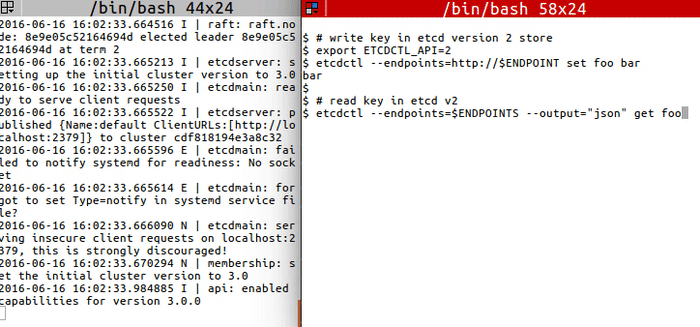
|
2016-06-17 05:47:57 +03:00
|
|
|
|
2019-12-02 22:03:32 +03:00
|
|
|
|
|
|
|
|
```shell
|
2016-06-17 05:47:57 +03:00
|
|
|
# write key in etcd version 2 store
|
|
|
|
|
export ETCDCTL_API=2
|
|
|
|
|
etcdctl --endpoints=http://$ENDPOINT set foo bar
|
|
|
|
|
|
|
|
|
|
# read key in etcd v2
|
|
|
|
|
etcdctl --endpoints=$ENDPOINTS --output="json" get foo
|
|
|
|
|
|
|
|
|
|
# stop etcd node to migrate, one by one
|
|
|
|
|
|
|
|
|
|
# migrate v2 data
|
|
|
|
|
export ETCDCTL_API=3
|
|
|
|
|
etcdctl --endpoints=$ENDPOINT migrate --data-dir="default.etcd" --wal-dir="default.etcd/member/wal"
|
|
|
|
|
|
|
|
|
|
# restart etcd node after migrate, one by one
|
|
|
|
|
|
|
|
|
|
# confirm that the key got migrated
|
|
|
|
|
etcdctl --endpoints=$ENDPOINTS get /foo
|
|
|
|
|
```
|
|
|
|
|
|
2016-06-23 21:50:37 +03:00
|
|
|
|
|
|
|
|
## Member
|
|
|
|
|
|
|
|
|
|
`member` to add,remove,update membership:
|
|
|
|
|
|
2019-12-02 22:03:32 +03:00
|
|
|
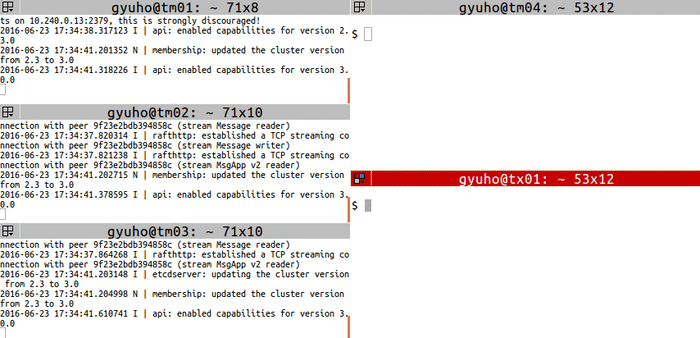
|
2016-06-23 21:50:37 +03:00
|
|
|
|
2019-12-02 22:03:32 +03:00
|
|
|
```shell
|
2016-06-23 21:50:37 +03:00
|
|
|
# For each machine
|
|
|
|
|
TOKEN=my-etcd-token-1
|
|
|
|
|
CLUSTER_STATE=new
|
|
|
|
|
NAME_1=etcd-node-1
|
|
|
|
|
NAME_2=etcd-node-2
|
|
|
|
|
NAME_3=etcd-node-3
|
|
|
|
|
HOST_1=10.240.0.13
|
|
|
|
|
HOST_2=10.240.0.14
|
|
|
|
|
HOST_3=10.240.0.15
|
|
|
|
|
CLUSTER=${NAME_1}=http://${HOST_1}:2380,${NAME_2}=http://${HOST_2}:2380,${NAME_3}=http://${HOST_3}:2380
|
|
|
|
|
|
|
|
|
|
# For node 1
|
|
|
|
|
THIS_NAME=${NAME_1}
|
|
|
|
|
THIS_IP=${HOST_1}
|
|
|
|
|
etcd --data-dir=data.etcd --name ${THIS_NAME} \
|
|
|
|
|
--initial-advertise-peer-urls http://${THIS_IP}:2380 \
|
|
|
|
|
--listen-peer-urls http://${THIS_IP}:2380 \
|
|
|
|
|
--advertise-client-urls http://${THIS_IP}:2379 \
|
|
|
|
|
--listen-client-urls http://${THIS_IP}:2379 \
|
|
|
|
|
--initial-cluster ${CLUSTER} \
|
|
|
|
|
--initial-cluster-state ${CLUSTER_STATE} \
|
|
|
|
|
--initial-cluster-token ${TOKEN}
|
|
|
|
|
|
|
|
|
|
# For node 2
|
|
|
|
|
THIS_NAME=${NAME_2}
|
|
|
|
|
THIS_IP=${HOST_2}
|
|
|
|
|
etcd --data-dir=data.etcd --name ${THIS_NAME} \
|
|
|
|
|
--initial-advertise-peer-urls http://${THIS_IP}:2380 \
|
|
|
|
|
--listen-peer-urls http://${THIS_IP}:2380 \
|
|
|
|
|
--advertise-client-urls http://${THIS_IP}:2379 \
|
|
|
|
|
--listen-client-urls http://${THIS_IP}:2379 \
|
|
|
|
|
--initial-cluster ${CLUSTER} \
|
|
|
|
|
--initial-cluster-state ${CLUSTER_STATE} \
|
|
|
|
|
--initial-cluster-token ${TOKEN}
|
|
|
|
|
|
|
|
|
|
# For node 3
|
|
|
|
|
THIS_NAME=${NAME_3}
|
|
|
|
|
THIS_IP=${HOST_3}
|
|
|
|
|
etcd --data-dir=data.etcd --name ${THIS_NAME} \
|
|
|
|
|
--initial-advertise-peer-urls http://${THIS_IP}:2380 \
|
|
|
|
|
--listen-peer-urls http://${THIS_IP}:2380 \
|
|
|
|
|
--advertise-client-urls http://${THIS_IP}:2379 \
|
|
|
|
|
--listen-client-urls http://${THIS_IP}:2379 \
|
|
|
|
|
--initial-cluster ${CLUSTER} \
|
|
|
|
|
--initial-cluster-state ${CLUSTER_STATE} \
|
|
|
|
|
--initial-cluster-token ${TOKEN}
|
|
|
|
|
```
|
|
|
|
|
|
|
|
|
|
Then replace a member with `member remove` and `member add` commands:
|
|
|
|
|
|
2019-12-02 22:03:32 +03:00
|
|
|
```shell
|
2016-06-23 21:50:37 +03:00
|
|
|
# get member ID
|
|
|
|
|
export ETCDCTL_API=3
|
|
|
|
|
HOST_1=10.240.0.13
|
|
|
|
|
HOST_2=10.240.0.14
|
|
|
|
|
HOST_3=10.240.0.15
|
|
|
|
|
etcdctl --endpoints=${HOST_1}:2379,${HOST_2}:2379,${HOST_3}:2379 member list
|
|
|
|
|
|
|
|
|
|
# remove the member
|
|
|
|
|
MEMBER_ID=278c654c9a6dfd3b
|
|
|
|
|
etcdctl --endpoints=${HOST_1}:2379,${HOST_2}:2379,${HOST_3}:2379 \
|
|
|
|
|
member remove ${MEMBER_ID}
|
|
|
|
|
|
|
|
|
|
# add a new member (node 4)
|
|
|
|
|
export ETCDCTL_API=3
|
|
|
|
|
NAME_1=etcd-node-1
|
|
|
|
|
NAME_2=etcd-node-2
|
|
|
|
|
NAME_4=etcd-node-4
|
|
|
|
|
HOST_1=10.240.0.13
|
|
|
|
|
HOST_2=10.240.0.14
|
|
|
|
|
HOST_4=10.240.0.16 # new member
|
|
|
|
|
etcdctl --endpoints=${HOST_1}:2379,${HOST_2}:2379 \
|
|
|
|
|
member add ${NAME_4} \
|
|
|
|
|
--peer-urls=http://${HOST_4}:2380
|
|
|
|
|
```
|
|
|
|
|
|
|
|
|
|
Next, start the new member with `--initial-cluster-state existing` flag:
|
|
|
|
|
|
2019-12-02 22:03:32 +03:00
|
|
|
```shell
|
2016-06-23 21:50:37 +03:00
|
|
|
# [WARNING] If the new member starts from the same disk space,
|
|
|
|
|
# make sure to remove the data directory of the old member
|
|
|
|
|
#
|
|
|
|
|
# restart with 'existing' flag
|
|
|
|
|
TOKEN=my-etcd-token-1
|
|
|
|
|
CLUSTER_STATE=existing
|
|
|
|
|
NAME_1=etcd-node-1
|
|
|
|
|
NAME_2=etcd-node-2
|
|
|
|
|
NAME_4=etcd-node-4
|
|
|
|
|
HOST_1=10.240.0.13
|
|
|
|
|
HOST_2=10.240.0.14
|
|
|
|
|
HOST_4=10.240.0.16 # new member
|
|
|
|
|
CLUSTER=${NAME_1}=http://${HOST_1}:2380,${NAME_2}=http://${HOST_2}:2380,${NAME_4}=http://${HOST_4}:2380
|
|
|
|
|
|
|
|
|
|
THIS_NAME=${NAME_4}
|
|
|
|
|
THIS_IP=${HOST_4}
|
|
|
|
|
etcd --data-dir=data.etcd --name ${THIS_NAME} \
|
|
|
|
|
--initial-advertise-peer-urls http://${THIS_IP}:2380 \
|
|
|
|
|
--listen-peer-urls http://${THIS_IP}:2380 \
|
|
|
|
|
--advertise-client-urls http://${THIS_IP}:2379 \
|
|
|
|
|
--listen-client-urls http://${THIS_IP}:2379 \
|
|
|
|
|
--initial-cluster ${CLUSTER} \
|
|
|
|
|
--initial-cluster-state ${CLUSTER_STATE} \
|
|
|
|
|
--initial-cluster-token ${TOKEN}
|
|
|
|
|
```
|
|
|
|
|
|
|
|
|
|
|
|
|
|
|
## Auth
|
|
|
|
|
|
|
|
|
|
`auth`,`user`,`role` for authentication:
|
|
|
|
|
|
2019-12-02 22:03:32 +03:00
|
|
|
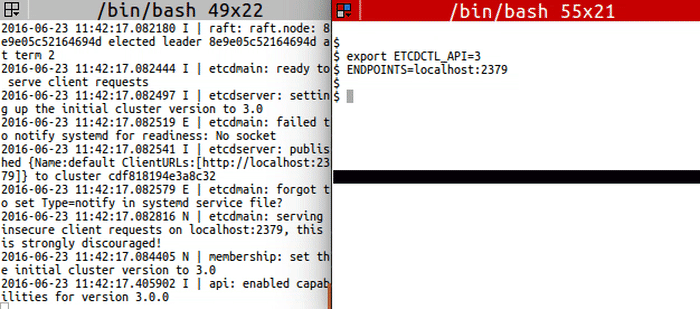
|
2016-06-23 21:50:37 +03:00
|
|
|
|
2019-12-02 22:03:32 +03:00
|
|
|
```shell
|
2016-06-23 21:50:37 +03:00
|
|
|
export ETCDCTL_API=3
|
|
|
|
|
ENDPOINTS=localhost:2379
|
|
|
|
|
|
|
|
|
|
etcdctl --endpoints=${ENDPOINTS} role add root
|
|
|
|
|
etcdctl --endpoints=${ENDPOINTS} role grant-permission root readwrite foo
|
|
|
|
|
etcdctl --endpoints=${ENDPOINTS} role get root
|
|
|
|
|
|
|
|
|
|
etcdctl --endpoints=${ENDPOINTS} user add root
|
|
|
|
|
etcdctl --endpoints=${ENDPOINTS} user grant-role root root
|
|
|
|
|
etcdctl --endpoints=${ENDPOINTS} user get root
|
|
|
|
|
|
|
|
|
|
etcdctl --endpoints=${ENDPOINTS} auth enable
|
|
|
|
|
# now all client requests go through auth
|
|
|
|
|
|
|
|
|
|
etcdctl --endpoints=${ENDPOINTS} --user=root:123 put foo bar
|
|
|
|
|
etcdctl --endpoints=${ENDPOINTS} get foo
|
|
|
|
|
etcdctl --endpoints=${ENDPOINTS} --user=root:123 get foo
|
|
|
|
|
etcdctl --endpoints=${ENDPOINTS} --user=root:123 get foo1
|
|
|
|
|
```
|